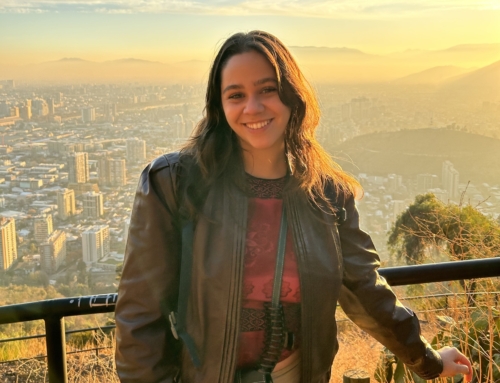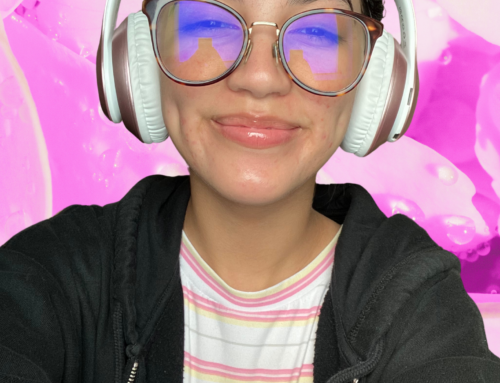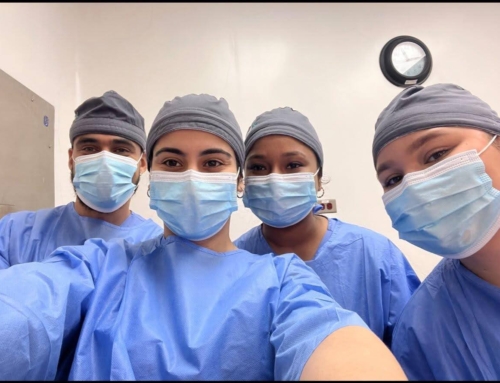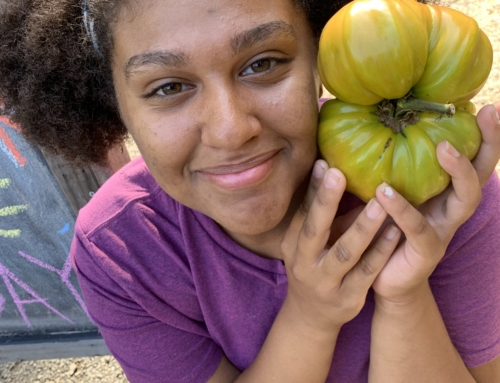By Joel Tolman
Director of Impact & Engagement

Janet Sakouvogui ’15 transferred colleges after her first year — but not before she organized with other students to combat racism on her campus.
Janet Sakouvogui, CG class of 2015, arrived at college excited — about the small campus setting that reminded her of Common Ground, an opportunity to re-connect with her childhood memories in an agricultural community in Africa, a chance to deepen her study of environmental issues, the big leap of living away from home. She was ready and poised, and thought she had found the place that would help her succeed.
But reality was different. Janet struggled to find her place as one of the only students of color on a small college campus. She faced overt racism from students and members of the surrounding community, a faculty that didn’t include a single person of color, and a college administration that was slow to respond when she and peers challenged them to do better.
At the end of her freshman year, Janet decided to transfer to another college – but she left her mark before doing so:
I realized my college was not built for students of color. I started thinking about other students of color, and how they felt. I could transfer, but they were stuck and couldn’t just leave because they couldn’t waste their parents’ money. That’s when I suggested starting a club call the ROOTs, which is for anybody who calls themselves a student of color. After creating this group with three other students, I realized that I was a strong person. I realized that I am a natural leader, and I also realized that there isn’t anybody in this world that can break me down and make me hate my skin color.”
There are probably a number of reasons Janet had the resilience to persist and make change in the midst of a genuinely challenging situation. But she gives part of the credit to her four years at Common Ground.
Common Ground tries to teach their students to be environmental leaders, and forgets that they are doing way more than that. They are helping their students to have a voice and to stand up in any situation and be a true leader. If it wasn’t for the leadership personality I learned from Common Ground, I wouldn’t be able to think about creating a group like ROOTs.
Janet’s story is part of bigger patterns. This fall, I shot Facebook messages out to members of Janet’s graduating class of 2015. This was a pretty special class (admittedly, I would tend to say that of every one of our graduating classes). One thing that stood out: The class achieved a 100% high school graduation rate. In other words, every student who started as a freshman either graduated on time or successfully transferred to another school. Clearly, the young people who made up this class knew something about persistence, about finding their power.

Malik Joyner ’15 balances classes at Gateway Community College with continued work planting trees and stewarding urban oases around New Haven.
I asked the members of the class of for two things: a quick update on something about life after high school that really stood out for them, and a reflection on part of their Common Ground experience that impacted their ability to succeed after high school. I was a little overwhelmed by what I got back. Some of what they shared was strikingly hopeful:
- Malik has been “balancing college and work planting trees with the Urban Resources Initiative, finding time to complete my studies while doing work that makes our community stronger.”
- Elmer is already sharing lessons learned as a first generation college student. “My team and I welcome current and new students into the college, helping to selecting their classes, etc.”
- Brandon “took a supervisor role at Junzi Kitchen and I continue to grow in the company.” Omar “recently hosted a chef’s table for Junzi; I basically created a three course meal and served it to 30 customers.”
- Dante spent the summer after freshman year “in China, conducting interviews about the migrant labor issue.” He got back in time “to protest the North Dakota access pipeline.”
- As part of a college class, Grace “worked on habitat restoration, monitoring areas that we hoped Atlantic Salmon would return, clipping fins to identify young captive breed salmon that would be released and, then getting to release the young into the wild.”
- Right after graduation, Marcel “went to Wyoming for 30 days on a scholarship received from The Nature Conservancy, where I backpacked through the Wind River Range. Then, this summer, I worked with the Appalachian Mountain Club’s crew at Lonesome Lake Hut in the White Mountains of New Hampshire.” Now, he’s back in New Haven, working at Common Ground while taking college courses.

Dante Petti ’15 traveled to China to conduct research on migrant labor issues between his first and second years at Earlham College.
These stories are exactly what Common Ground hopes for our graduates: Alumni growing into more and more powerful environmental leaders and community change-makers. Young people finding their passions, and creating their own paths to follow them. Young people — many of them the first in their family to go to college — figuring out how to succeed in higher education and in careers.
At the same time, Janet certainly wasn’t the only one of these students who hit roadblocks on her path through college. Many of our grads take routes that involve detours, resetting the GPS after a wrong turn, deciding their original destination wasn’t the right one after all. And much of the time, especially for young people who face systemic barriers to college success, there is no road to travel, or one that involves so many potholes it’s almost impassible. These students have to create a new way, and need our help to do so.
I caught Reilly, one of Janet’s classmates, at a time when she was unsure about the path she’d chosen: “Mr. Tolman!” she wrote, “Great to hear from you, I’m doing well. However, I don’t know if I can really help with this!” She continued:
Of course Common Ground has helped me become the young person I am and I’m proud of that fact, but so far college hasn’t really been affording me as many of the opportunities to do fun/interesting things as Common Ground did… In all honesty, I’m just trying to keep my head above water.
She continued saying, “CG was much gentler than UConn is. I’ll keep thinking and get back to you, but I don’t wanna get your hopes up.”
A few days later, after a few other messages back and forth — about the impact of Common Ground’s growing student body on school culture, a scholarship that will let Reilly travel abroad later in college, the way we sometimes can’t recognize our own strengths — Reilly shared what struck me as a pretty powerful story:
“I joined a drama club and started off as just a cast member, but once I saw what was going on behind the scenes I kind of couldn’t help but get involved and take on a leadership role. I’m not THE leader of the club by far, but last semester and this semester, myself and a group of other students have been working on a production together. We put on short scenes tied together by a narration. Last semester we did “gender on the edge,” which was exploring the way gender and sexuality can be funky and weird through some famous theater pieces.”
When students like Janet and Reilly struggle and find their way, we have to ask ourselves: what can we do to help? Sometimes, it feels like the future of our graduates is out of our hands, and more than a little tenuous. Facebook chats, twice-a-year face-to-face conversations, data reports on college enrollment, and an occasional phone call seem like a fragile foundation for supporting the young adults we care so much about. Some of that is natural — we need to let students define their own direction, make their own way. But they also shouldn’t have to go it alone.
So, what can schools like Common Ground do to support graduates? The members of Common Ground’s class of 2015 have some wisdom to share on this front, as well.
In high school, give students space to face and overcome obstacles. For instance, Reilly knew how to deal with resource scarcity from her time at Common Ground — and so wasn’t phased by it when her drama club at UConn had limited resources. “One thing that especially helped from Common Ground was honestly budgeting, and the fact that we are starting from very little theater resources. I was fine with this because the auditorium we have at UConn is like 10x better than the cafegymatorium I was used to from CG, but my fellow leaders were used to way more elaborate theater clubs/programs and a lot of the time were getting really hung up on money stuff. So I was able to step in at times and provide reasonable and cost effective suggestions/solutions to some of our problems. To me, compared to the $0 drama club got when I was involved with it, our budget was huge. We ended up putting on a really great show, and will hopefully be putting on another great one on December 1st and 2nd (if you or anyone else from CG is interested in coming). But we came from small beginnings, so I felt right at home.”
Help students find their passion, take healthy risks, navigate genuinely new situations. Jesus is going to college “in a rural back country town in Maine, where minorities are far and few between. I’ve been managing my own finances, I’ve been volunteering more and more trying to further progress down my career path, already spent countless hours up at night trying to balance hard work and leisure.” What helps him stick with it in the midst of these challenges? Jesus says that “CG had taught me to step out my comfort zone, and really apply my whole being to what I’m doing in that moment while still staying focused and grounded with everything else going on around me. I’d begun to really develop and realize my passions in high school, and college has given me the chance to fully pursuit them.”
Build students’ capacity to recognize systems and interconnections. Elmer is grateful to have gone to an environmental high school, where the connections between things were always front and center. “I do believe that a lot of the learning that took place at CGHS during my time as a student there really accelerated my holistic view of the world. I always like to refer back to critical thinking classes like Sustainable Design or AP Lit, but also in my time at Green Jobs Corps as a fantastic learning experience.”

Marcel Aguirre ’15 explores the Wind River Range in Wyoming, thanks to a scholarship from The Nature Conservancy.
Cultivate flexibility and the capacity to connect with people with different worldviews. Marcel explains that “one of the biggest things that I learned and practice from CG is to explore ideas and take lead or follow in any situation. Some of this evolved into connecting to people (some of which happen to lead to odd-jobs and new experiences), teach others to turn mistakes into lessons or an experiment (situation dependent), even debate with people on complex or controversial topics (sometimes with religion being involved) while not losing self control and see the other view points that would be described.”
Challenge students to do college-level work in high school. Meghan, a full-time college student, is grateful to have been pushed beyond what she thought was possible in high school. “One thing CG helped support me for my post high school would have to be the AP Language and Composition class. Having that class kicked my butt in high school, but it sure did teach me how to write at a college level. And not only that, but to make an impression with my writing. It gave me a good, strong foundation. Now, college writing classes are easy.”
Our work isn’t over when students graduate. Brandon — who just cooked up an amazing pop-up menu at the restaurant where he works — is grateful for Common Ground’s support after graduation. “As we speak, Mr.K and I are planning on meeting so I can get more information about culinary classes. I’ve been interested for a while, and he told me to come in and he will help me out. This helped me because with certifications, I can get higher positions and/or pay raises.”
All this is important. But Janet’s story reveals one of the most important lessons: We need to be honest about the systemic barriers that young people from marginalized communities will face on their path to college — and help students build the capacity they need to dismantle these barriers. Janet and other students have to make nearly impossible choices about whether to try to change institutions that don’t welcome them or find safer, more supportive spaces. As a white male, I can’t imagine what that is like. But I can connect my students with mentors who have navigated similar situations, and use the privilege I do have to help them navigate these spaces. And we can help students build the system analysis capacity, organizing skills, and self-awareness that will help them build the world they deserve.
Most important, I can keep on listening to my students — and finding allies (like you?) who are ready to step up to help them persist and find their power.








All I can say is Wow!